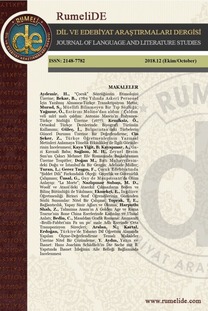Awakening a Nation: A Rhetorical Analysis of Derek Walcott’s “The Sea Is History”
Awakening a Nation: A Rhetorical Analysis of Derek Walcott’s “The Sea Is History”
This paper analyses Derek Walcott’s (1930 – 2017) poem “The Sea Is History” (1979) from a rhetorical perspective. The rhetorical analysis of the poem enables us to uncover the implicit cultural values of Caribbean people and the oppressive discourses of colonialism. Based on the rhetorical reading of the poem, this study questions the traditional notion of history in the postcolonial framework. “The Sea Is History” is from Walcott’s collection The Star-Apple Kingdom, originally published in 1979. In the poem, the author communicates with the reader by triggering an inner reaction through rhetorical questions. “The Sea Is History” is also notable for the use of metaphor and imagery. Walcott’s preoccupation with his nation’s notions of the past, culture, and language is expressed in the poet’s use of metaphors to call on the Caribbean to awaken from a deep sleep and hold history to account. The author’s inclusion of elements of the narrative is underpinned by a strong postcolonial feeling, transforming this narrative poem into the biography of an oppressed nation kept as slaves for centuries. By using allusions to the Bible, Walcott juxtaposes biblical stories with the past and the memory of his nation, hence his rhetorical question: “Where are your monuments, your battles, martyrs? Where is your tribal memory?”. Moreover, by placing biblical markers on certain passages of the voyage to the Caribbean – Genesis, Exodus, the Ark of the Covenant, and the Song of Solomon – the poet highlights it as a significant event that amounts to a religious text, at the same time pointing out that the events in the Bible are not universally accepted as actual events, whereas the past of his people is a true experience that reflects the colonial history of the Caribbean.
Keywords:
History, metaphor, postcolonial, rhetoric Walcott,
___
- Assmann, A. (2015). Dialogic memory. In P. Mendes-Flohr (Ed.), Dialogue as a Trans-disciplinary
- Concept: Martin Buber’s Philosophy of Dialogue and its Contemporary Reception (pp. 199-214). Berlin: De Gruyter.
- Assmann, A. (2018). Towards a new ethos of history? In S. Helgesson & J. Svenungsson (Eds.), The
- Ethos of History: Time and Responsibility (pp. 14-30). New York & Oxford: Berghahn Books.
- Baugh, E. (2006). Derek Walcott. Cambridge: Cambridge University Press.
- Bauman, Z. (2010). Hermeneutics and social science (Routledge revivals): Approaches to
- understanding. Routledge.
- Black, J., & MacRaild, D. M. (2016). Approaches to history: Sources, methods and historians. Studying
- History, 83-127.
- Boeninger, S. P. (2020). Literary Drowning: Postcolonial Memory in Irish and Caribbean Writing.
- Syracuse: Syracuse University Press.
- Carr, E. H. (1990). What is history? London: Penguin Books.
- Cuddon, J. A. (2013). A dictionary of literary terms and literary theory. Chichester: Wiley-Blackwell.
- Donnell, A. (2006). Twentieth-century Caribbean literature: Critical moments in Anglophone literary history. New York: Routledge.
- Donnell, A., & Welsh, S. L. (Eds.). (1996). The Routledge reader in Caribbean literature. London: Routledge.
- Gandhi, L. (2019). Postcolonial theory: A critical introduction. Columbia University Press.
- Göttsche, D. (2019). Memory and postcolonial studies: synergies and new directions. Berlin: Peter Lang International Academic Publishers.
- Heath, M. (Trans.) (1996). Aristotle: Poetics. London: Penguin.
- Ismond, P. (2001). Abandoning Dead Metaphors: The Caribbean Phase of Derek Walcott's Poetry. Kingston: University of West Indies Press.
- Jones, G. S. (1996). The determinist fix: some obstacles to the further development of the linguistic approach to history in the 1990s. In History Workshop Journal (No. 42, pp. 19-35). Oxford University Press.
- Lawson-Tancred, H. (Ed. & Trans.). (1991). Aristotle: The art of rhetoric. London: Penguin Books.
- Marwick, A. (1995). Two Approaches to Historical Study: The Metaphysical (Including ‘Postmodernism’) and the Historical. Journal of Contemporary History, 30(1), 5-35.
- McWatt, M. A. (1988). Literary profile: Derek Walcott: An island poet and his sea. Third World Quarterly, 10(4), 1607-1615.
- Roberts, W. R. (Trans.) (2015). Rhetoric by Aristotle. Fairhope: Mockingbird Publishing.
- Rothberg, M. (2013). Remembering back: Cultural memory, colonial legacies, and postcolonial studies. Oxford: Oxford University Press.
- Simkhovitch, V. G. (1929). Approaches to History I. Political Science Quarterly, 44(4), 481-497.
- Walcott, D. (2007). Selected poems. New York: Farrar, Straus and Giroux.
- Walder, D. (2009). Writing, representation, and postcolonial nostalgia. Textual Practice, 23(6), 935-946.
- ISSN: 2148-7782
- Yayın Aralığı: Yılda 6 Sayı
- Başlangıç: 2014
- Yayıncı: Yakup YILMAZ
Sayıdaki Diğer Makaleler
Yabancı/ikinci dil öğretiminde farklı yaş gruplarının pedagojisi
Osmanlı Dönemi’nde Kur’an tercümeleri ve Kurd Efendi’nin eserleri üzerine
Awakening a Nation: A Rhetorical Analysis of Derek Walcott’s “The Sea Is History”
Uygur harfli bir sivil hayat belgesinin metin dil bilimi açısından incelenmesi
Japonca ve Türkçe yansıma ikilemelerin fonosemantik açıdan karşılaştırmalı olarak incelenmesi
Cahit KAHRAMAN, Ayşe ÖZKAN AKDAĞ
Kargasabunu’nda Sözlü Kültürden Alınan İlhamın “Ekofolklor”a Dönüşümü
Juan José Arreola’nın “Makasçı” adlı kısa öyküsünde kaotik dünyanın eleştirisi ve ironi
A review of actor-oriented capitals and investments in the field of interpreting in Türkiye
